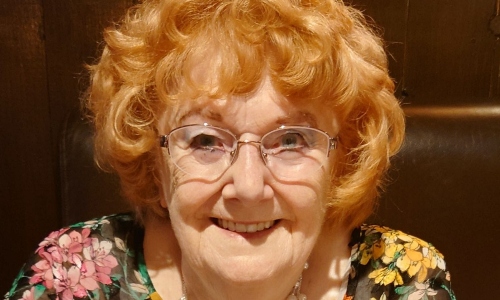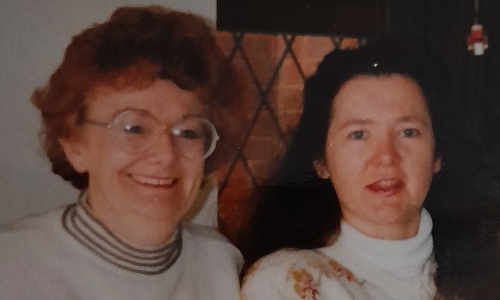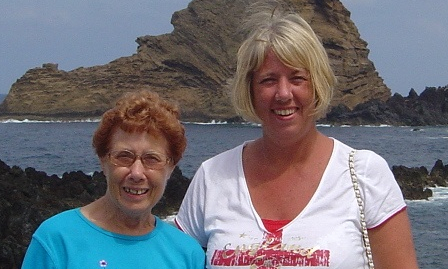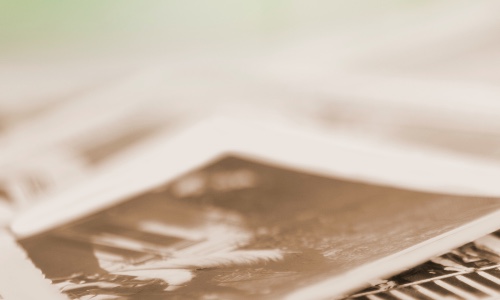Rosemary is 91 and lives in Kent. She was part of our Autumn fundraising campaign, bravely sharing her experiences of loneliness. Her daughter, Rowena, is proud and supportive of her mum’s relationship with Age UK – and the positive impact her regular telephone friendship calls provide.
We spoke to both mother and daughter, who give their accounts of their lives and how close their relationship remains, despite living almost 9,000 miles apart.

Rosemary
“Rowena has lived in Australia for something like 30 years now. She’s a senior speech pathologist, who specialises in throat cancer and cancer of the mouth. I’m very proud of her.
“I had two sons, then Rowena was born three days after my elder son’s third birthday, so I had three children under the age of three. They grew up together, with none of them knowing a life without the others. As much as I adored my sons, I so wanted a daughter and was thrilled when I got one. Looking back, things were different in those days. Children were fed differently and didn’t stay up late; life was much simpler for parents.
“My own mother was very particular – everything had to be just so all the time. The saddest moment in my life, I think, was when I said goodbye to her, when she was 56, and she said to me, ‘What’s going to happen to my beautiful house?’ She was worried about her house – not her husband and not her daughter. That was very traumatic. She died a few days later.
My son died, which coloured everyone’s life for a long time.
“When I was younger and I was going to go out, which I didn’t do that much, my mother would always say, ‘Nobody will look at you’, so whenever I got to where I was going, I’d just hide in the corner. I made up my mind that if I had children, I’d always make sure to say they look nice. And I did – with my children and my grandsons.
“When my younger son was seven, he became ill. He had epilepsy and he got worse over the course of six years. In the end, he was paralysed down one side and lost the power of speech. I nursed him at home for six years. When he was 13, he went into a small hospital for a fortnight. The hospital suggested that he stay there. It was horrible leaving him, but he had a better life. He got to have physiotherapy every day and the staff were wonderful with him. I went every morning as soon as I could and would stay until the evening. Then my son died, which coloured everyone’s life for a long time. That was in 1972, which is a lifetime ago.
“I would say that Rowena and I are closer to each other than some women are with their children who live nearby. Being close with someone isn’t just about physical proximity. Rowena and I have the same stupid sense of humour and we laugh ever so much. When Rowena comes to visit me, it’s as if she’s never been away. She stays with me for a month. I only have a one-bedroom place, so she sleeps on a fold-up chair in the living room, which she says is very comfortable.
“Now I’m in a wheelchair, we’re more limited in the things we can do, but we try to go to London and to places with nice scenery, or to go and see relatives. We both like to watch television too, especially programmes about animals and people exploring other countries.
“The only frustration for me when Rowena comes here is that she waits on me hand and foot - I’m not allowed to do anything, whether that’s cooking or anything else. She does it all to look after me.
Rowena is very supportive of my relationship with Age UK.
“One of my daughter-in-law’s nephews is getting married in Colombia in August. A lot of the family will be going over, including my son. I would have been on my own for a fortnight, so Rowena has decided to come over during that period. That’s very sweet of her.
“Rowena is very supportive of my relationship with Age UK, as is my son. It has opened a door for me to another world, which is fantastic. My children like to see me interested in something and able to speak to people.”

Rowena
“My mother always worked hard to provide the best for us. For many women of her generation, you knitted and repaired, you made clothes and cooked home meals. One of my memories from when I was younger is that when someone popped by, or food was low in the pantry, my mother would be able to whip up a batch of scones in no time at all.
“It’s only in the last three or four years that my mother has shared with me that her mother could be harsh, which was quite a surprise to me, as she’d always spoken about her parents with high regard. Her mother died before I was born, so I never met her. It’s curious that as my mother’s got older, she’s started sharing information like that. She probably doesn’t feel she’s being disrespectful in saying something like that about her mother now – she’s just being truthful. Her father was also quite a nervous man, so my mother grew up as a bit of an introvert.
My mother grew up as a bit of an introvert.
“In her forties, however, my mother found herself and became something of an extravert. I think the change in my mother came from divorcing a difficult husband who was an alcoholic.
“My brother died when he was 14. In today’s terminology, he had an arteriovenous malformation in the brain, which caused several bleeds over the years. I was 12 when he died – and my oldest brother was 15. There was a huge sense of loss for us all.
“In the years afterwards, my mum began to find herself – the stars aligned, and she began to grow in confidence. By the time she moved from the house she’d grown up in, to a high-rise council estate, she found a sense of purpose and a use for her untapped skills.
“I didn’t know what I wanted to be when I was a teenager, but then I moved to Australia and got a degree in speech and hearing. For almost 30 years now I’ve worked as a speech pathologist, working with people with head and neck cancer who may have had part of their tongue or jaw removed in surgery, to help them with their speech. One of the reasons I was interested in that, and it didn’t seem so daunting, is because my brother had been in and out of hospital for all those years, so going to hospitals and being around people who were sick was quite normal.
When I go home to spend time with my mum, it's about rejoining her and establishing those bonds.
“Working in an acute care hospital, you see people at a real crux in their life, when hard decisions need to be made. It’s often a time when you see a lot of family discord and disharmony, but also these wonderful opportunities to spend joyful time together, enjoying one another’s company, even though someone is dying. For me, those things resonate, so when I go home to spend time with my mum, it’s about re-joining her and establishing those bonds.
“Yes, it’s for my mum and it’s for me when I come over to spend time with her, but it’s also for my brother. I live half a world away and my brother has the day-to-day worry of what happens when the phone rings and worrying if mum’s okay. If I’m there with my mother for a month, then my brother can switch off, because I’m there 24 hours a day, so I hope he gets a bit of relief from knowing I’m there with her.

“We grew up poor, mostly due to my dad’s alcoholism and gambling, so we’d have shoes filled with plastic bags and cardboard to stop the rain coming in. She always managed to get Christmas presents or birthday presents, though. Mum has always had an intense desire to help wherever she can.
“Now, mum experiences the sense of loss of not being able to leave the house, hang out the washing, or go to the shops. She’s a prisoner in her home, so every piece of contact she has is so important. Being a prisoner, she feels she has no sense of control – while in her earlier life, when she was mobile, she was on various committees and helped regenerate a council housing estate.
“She had such a fulfilling, important life, but when she couldn’t go anywhere, she lost all of that. Her isolation relates to feeling she can’t do anything – and she’s angry about that. She’s just expressing the feelings of a generous, vivacious woman who’s unable to do the things she wants to anymore.
The moment my mum was offered those phone calls from the Age UK Telephone Friendship Service at the start of COVID, she could not have been happier.
“My mum’s emotions are real, so despite what I’m able to do at my end, it doesn’t stop her feeling sad and lonely at times. That’s the reality of it.
“I’m staying with mum when my brother goes to Colombia. Hopefully with modern technology we can make some FaceTime calls and get a sense of what the wedding is like.
“The moment my mum was offered those phone calls from the Age UK Telephone Friendship Service at the start of COVID, she could not have been happier. My mum and [her telephone friend] Ron get on so well. It’s a lovely match up. They have many important things in common, so Ron is an absolute godsend to her.
“The fact that it’s the same person ringing regularly allowed them to establish a real, proper friendship in which they share joy and sadness. When I’ve been there and Ron has phoned, I can tell how much he appreciates their friendship too. And, more recently, mum was offered the chance to be connected with a second telephone friend, Sarah, and she very much enjoys those calls too.”





